In this article:
Hair washing is an essential part of a hair care routine. Most women tend to follow a regular hair wash schedule to avoid greasy hair as well as unwanted frizz. (1)
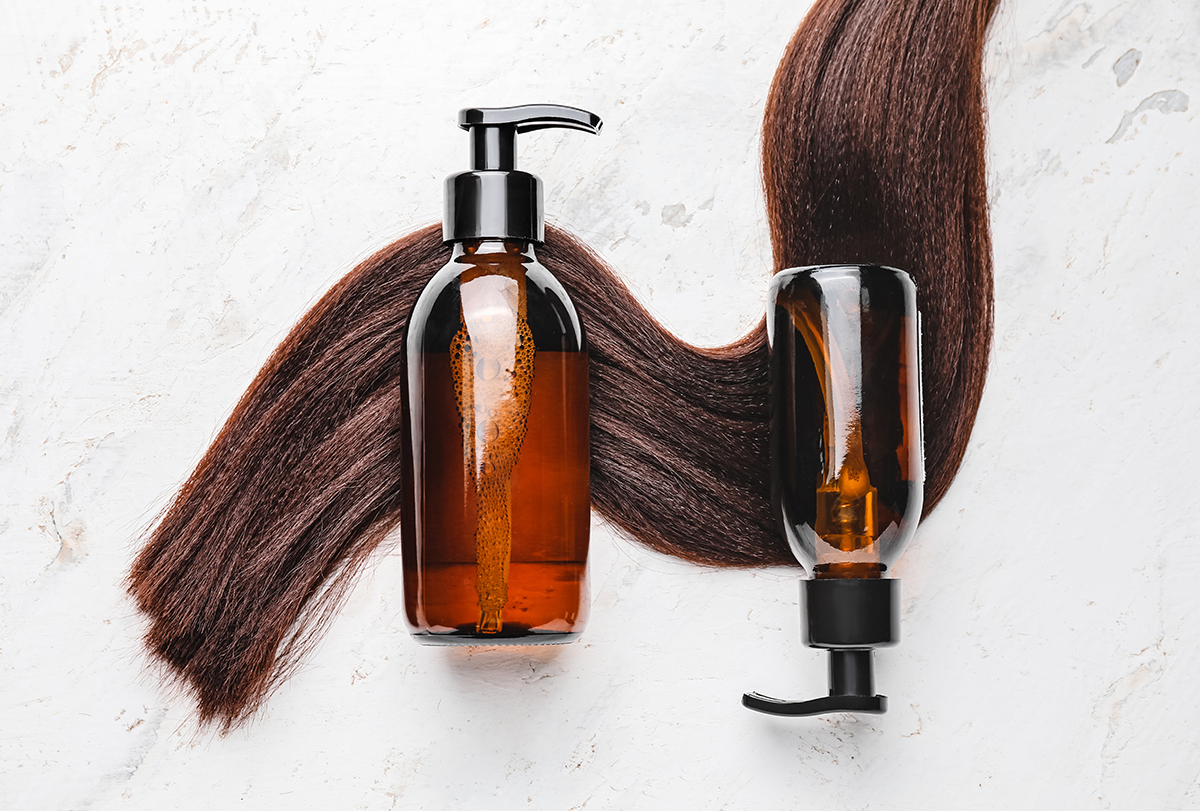
One of the most commonly asked questions when it comes to hair washing is whether to apply conditioner before or after shampooing your hair. Multiple sources provide different answers, and this article will let you have a deeper look at this issue.
Scientifically, Which One to Apply First, Shampoo or Conditioner?
Shampooing your hair, rinsing it off, and then applying a conditioner is generally the most accepted way of washing your hair (and the stance of most researchers and doctors). On the other hand, conditioning your hair before shampooing is not supported by any scientific evidence, but anecdotal evidence is plenty.
Think about it – shampoos are meant to cleanse off all the dirt and excess grease from your scalp. However, they also end up stripping your hair off its natural oils and making them frizzy.
Applying a conditioner before shampoo leaves a sebum-like residue on the hair strands and protects them from the harsh effects of the shampoo. (3)(2)(1)
Apply Conditioner After Shampoo (Reverse Washing Protocol):
– If you want to stick to the basic protocol, as explained by researchers
The most commonly held view among scientists and dermatologists alike is that it is better to condition your hair after shampooing. (2)(1)
Shampoos cleanse oil and dirt from the scalp. However, overshampooing or using harsh shampoos can strip the hair of its natural oils and leave it dry or frizzy. That is where conditioners come in handy.
Hair conditioners help coat the hair strands in a hydrating layer, adding shine and softness to them. Conditioners also help protect the hair from hair damage caused by exposure to harsh environmental conditions. (3)
– If you have fine, dull, damaged hair and you are seeking extra volume, as explained by some experts
There is a new hair care trend known as reverse hair washing that is gaining attention among dermatologists and hair care experts. Reverse hair washes generally refer to the practice of conditioning your hair before using shampoo.
According to some doctors, conditioners leave a protective layer around the hair strands that helps lock in moisture and prevents dryness caused by shampooing. (4) It also helps add luster and volume to otherwise dull hair.
This method of conditioning is great for people who tend to have thin, greasy hair after shampooing and conditioning. (5) However, there is no scientific proof for this concept yet.
Benefits of Conditioning Before Shampooing
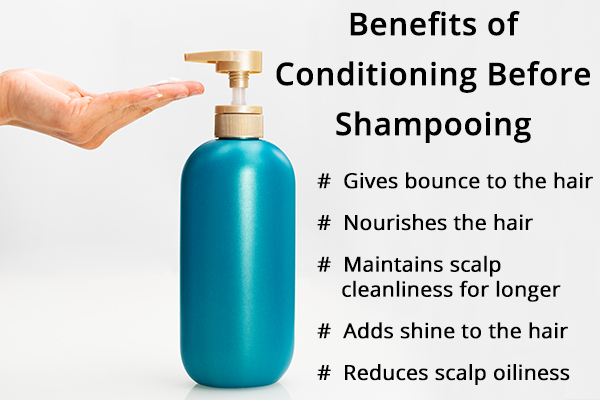
Conditioning your hair before shampooing provides the following benefits:
- Gives bounce to hair: Conditioning your hair after shampooing generally leaves a greasy layer of conditioner on it. This may make your hair appear thin, especially if you have fine hair. Shampooing after conditioning helps get rid of this issue.
- Nourishes the hair: Many conditioners help increase the keratin protein in the hair, adding softness and smoothness to it. Conditioning your hair before shampooing helps you gain the maximum benefit of this.
- Maintains scalp cleanliness for longer: Shampooing after conditioning cleanses the scalp without drying the hair and helps the scalp stay clean for longer.
- Adds shine to hair: Most hair conditioners contain ingredients that add life and luster to the hair. Shampooing your hair after using such conditioners will add shine to the hair without weighing your hair down.
- Reduces scalp oiliness: Conditioning before shampooing is also good for people who tend to have oily scalp or hair as it softens the hair without leaving it extra greasy.
The Right Way to Apply Conditioner Before Shampoo
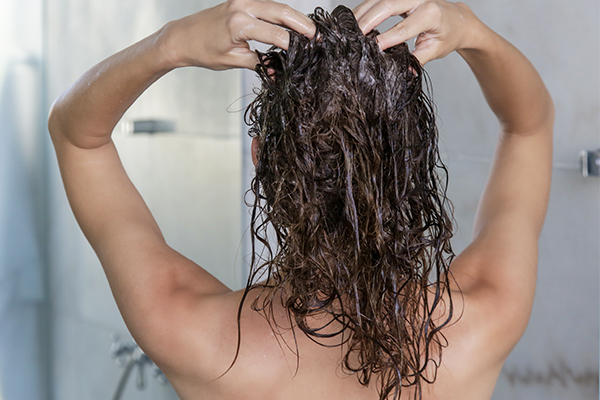
Here is an easy step by step guide on how to reverse wash your hair:
- Soak your hair in warm water as it dampens the hair and opens the pores. (6)
- Gently massage the conditioner onto your scalp and hair.
- Leave it in for at least 3 minutes.
- Apply shampoo and wash your hair.
Tips and Tricks When Applying Conditioner Before Shampoo
When using the reverse wash technique to get the maximum benefit, keep these tips in mind:
- Do not wash out the conditioner before applying shampoo. The conditioner forms a protective sebum-like layer over your hair strands and prevents them from drying out.
- Let the conditioner soak into your hair for at least 3–5 minutes before washing.
Who Should Not Apply Conditioner Before Shampoo?
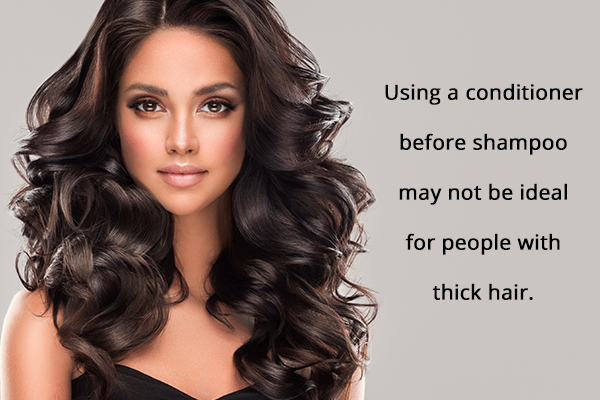
While the reverse hair wash sounds like a good idea to try, it may not be as effective for everyone. People who have thick or curly hair may find conditioning before shampooing not useful for them.
For thick hair:
Thick hair tends to require higher amounts of conditioner to remain well-behaved and smooth all day. Thus, using a conditioner before shampoo may not be ideal for people with this hair type.
A good way to overcome this is by conditioning both before and after shampooing.
The Chemistry of Shampoo and Conditioner
Take a look at what shampoos and conditioners are made of and how they work.
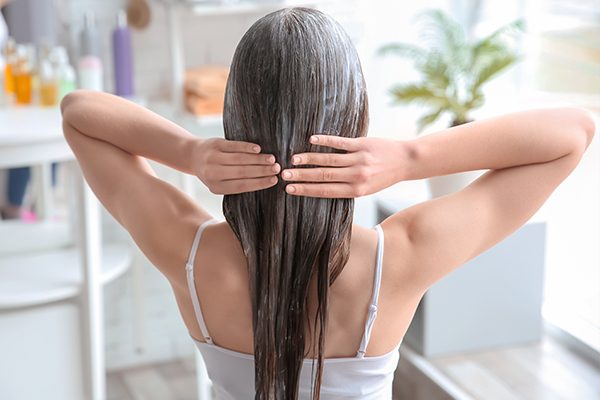
What does shampoo do and what does it contain?
Shampoos are made up of one or more chemical cleansing agents that get rid of sebum, dust, dandruff, and grime deposits from the scalp. The cleansing effect helps the hair follicles breathe easily and promotes a healthy scalp environment for hair growth. (1)
What does conditioner do and what does it contain?
Most commercial conditioners contain hydrating agents that lock in moisture into the hair strands.
They also contain a positively charged surfactant that gets attracted to the negatively charged hair strands and thus helps the conditioner molecules latch onto them. Thus, conditioners tend to leave a protective moisturizing layer on the hair.
What Happens if You Use Conditioner Without Shampoo?
Using a conditioner suitable for your hair type is essential to maintaining healthy hair. Washing your hair with shampoo cleanses the scalp thoroughly and gives your hair roots a healthy environment to grow in.
However, not conditioning your hair strips the hair of its natural sebum layer and leaves it frizzy, dull, or dry. In the long run, this can cause split ends and hair damage.
What About 2-in-1 Shampoos?
We have recently seen an increase in 2-in-1 shampoos on the market. These products have been developed to function as both shampoos and conditioners.
2-in-1 shampoos generally contain cleansing agents or surfactants like most shampoos, but they also contain conditioning ingredients such as silicone oil droplets. While the surfactant cleanses the scalp, the silicone droplets act as a positively charged conditioner and attach to the hair, softening it. (1)
Shampoos and Conditioners for Sensitive Scalp
The proper use of hair care products may help to increase patients’ adherence to alopecia treatments and avoid health problems related to inadequate application of hair cosmetics and procedures.
People with sensitive scalps tend to react to hair care products very quickly. Hence, if you have a sensitive scalp, it may be best to avoid shampoos and conditioners that contain harsh chemical ingredients. Opt for mild or nature-based hair care products that are gentle on the skin and do not cause itching or irritation. (7)(8)
Can Shampoos and Conditioners Cause Adverse Effects?
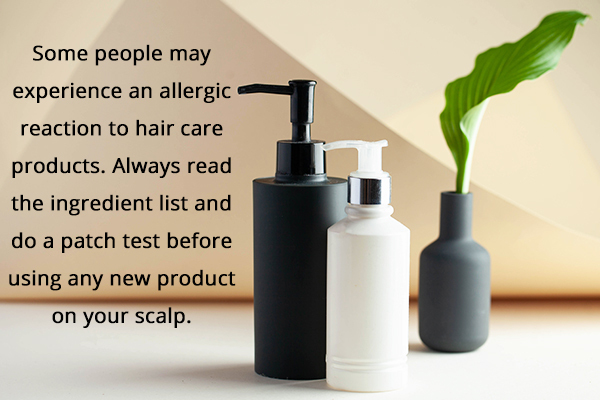
Most of the time, no. Shampoos and conditioners are everyday household essentials used all over the world. Having an adverse reaction to them is very rare.
However, shampoos may cause hair damage in the long run if you keep using ones that are not meant for your hair type. Every hair type is different, and it is necessary to find the products that suit yours for maximum benefit.
In rare cases, some people may experience an allergic reaction to hair care products. Always read the ingredient list and perform a patch test before using any new product on your scalp. (5) Contact a doctor immediately in case of an allergic reaction.
Final Word
Conditioning your hair is vital for soft and lustrous locks. You can condition your hair before or using shampoo, depending on your hair type.
Conditioning before shampooing is particularly beneficial for people with thin or fine hair as it adds bounce and shine to the hair. However, if you have thick, coarse, or curly hair, you may be better off sticking with the traditional method of conditioning after shampooing. (9)
- Was this article helpful?
- YES, THANKS!NOT REALLY


